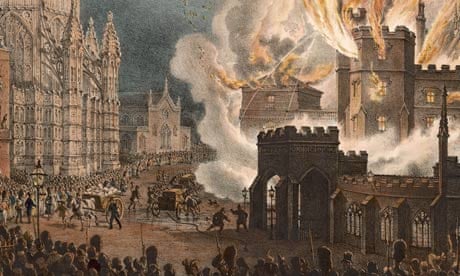In future tables of chronological events, the terrible destruction occasioned by a fire which broke out last evening, will stand out in startling effect. The mere announcement to our readers that the House of Lords, the House of Commons, and all their various offices, have become a prey to the unsparing element, will awaken feelings in which sorrow, astonishment, and doubt will be singularly mingled. But such, unwelcome and lamentable as may be the knowledge of it, is too certainly the truth.
At half-past five in the evening, a friend of ours passed up Abingdon street and between the Houses of Parliament and the Abbey, when all was still, and as apparently free from danger as the most sacred or secure building in the kingdom; yet within a short hour from that period, the interior of the House of Lords was filled with one vast flame, casting its lurid glare far over the horizon - lighting up the broken clouds above, which were driven on before a strong westerly gale - spreading over the silent Thames a vast sheet of crimson, that seemed to smother the more feeble rays of the rising moon - bringing out the stately and majestic towers of the abbey in strong relief against the deep blue western sky, with a bright white tint, strange and sepulchral in contrast with all around and playing with seemingly wayward and fantastic scintillations on the inimitable fretwork of the Seventh Harry's chapel.
A fierce volume of flame, fed rather than controlled by the wind, forced its way upwards to some height above the devoted buildings in which it reigned unchecked, until gradually losing its power, and following the direction of the gale, it bent forward towards the east and extending far across the river, covered the opposite shore in a wreath of murky smoke. Immediately opposite the devastating ruin, from the vicinity of Lambeth Palace, the scene partook of a different character. More of the detail of destruction was visible. At the time of our arrival at this point, it was evident that the House of Commons had shared the same fate with the House of Lords.
The gable end of the former, the last relic of the chapel of St Stephen, with its beautiful gothic window, stood up between us and the glowing furnace of fire in strong and beautiful outline. Whilst at intervals, as the smoke varied in its motion, other portions of gothic architecture, oriel windows, turrets, and towers, broke on the view; and all within side them was feeding the devouring element.
By half-past seven o'clock the engines were brought to play upon the building both from the river and the land side, but the flames had by this time acquired such a predominance, that the quantity of water thrown upon them produced no visible effect, and in less than an hour from the time at which the flames first appeared the entire roof of the House of Lords had fallen in.
The firemen now abandoned all hopes of saving any part of this portion of the building, and their attention and efforts were from this time wholly directed towards the House of Commons, and to the preservation of that venerable structure, Westminster Hall, which for the beauty of its architecture, and its close connection with some of the most important events of our history is equally admired and estimated by the antiquarian, the man of science, and the citizen. For some time their efforts were successful, but not so ultimately.
The wind, which previous to this time had blown from the south, that is, in a direct line from Abingdon street towards Charing Cross, now, at near eight o'clock, veered somewhat towards the west, thus throwing the flames immediately upon the House of Commons, the angle of which abutting upon the House of Lords, caught fire, and notwithstanding the utmost exertions of the firemen, assisted by the military, the roof ignited, the wood work of which being old and dry, the flames spread with the rapidity of wild fire, and in a very short time indeed, the whole of the roof of this ancient building fell in with a tremendous crash, accompanied with an immense volume of flame and smoke, and emitting in every direction millions of sparks and flakes of fire. This appearance, combined with the sound, resembling the report of a piece of heavy ordnance, induced the assembled multitude to believe that an explosion of gunpowder had taken place, and the scene of confusion which followed baffles the power of description.
(Abridged from the Morning News, 17 November 1834)

Comments (…)
Sign in or create your Guardian account to join the discussion